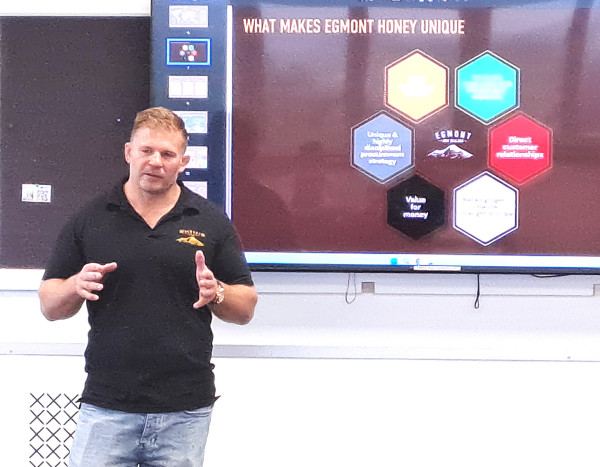Honey hero on how to get business buzzing
A good brand story, cutting out the middleman and being directly involved at all levels of the business – just some of the insights globally successful Taranaki business entrepreneur James Annabell shared with WITT business students recently.
James, the founder and CEO of Egmont Honey, revealed how his enterprise blossomed from a local entity to a multi-million-dollar international business. It started a decade ago when he bought his father a beehive off Trade Me for a present.
Now, the naturally healthy superfood or ‘pot of gold’ – quintessential New Zealand Mānuka honey - is popular in many countries and sold via mass retailers like Costco and other major supermarket chains from Asia to Europe, the Middle East to the UK.
Passion for the product
Speaking to students enrolled in the Bachelor of Applied Management, Bachelor of Accounting and Diploma in Business, James shared insights from his decade running Egmont Honey, which last year reaped $20m+ EBIDTA (Earnings Before Interest, Taxes, Depreciation). The business was sold to global food empire, Nestle, in 2022, and then to a Chinese equity fund this year for $140m. James still has a stake in the enterprise – financially and in management.
He spoke about the importance of building a personal rapport with clients and having a strong origin story – in his case, the health and medicinal qualities of honey made from New Zealand’s native flowering Mānuka tree. He emphasized the value of not being afraid to do things differently, opting for brand ambassadors and smart digital marketing over tv ads and big billboards and above all, ensuring the quality of product. A love of customer interaction and business dealings world-wide are also part of his success. Being a founder-led rather than fronted by a corporate CEO also added value.

Business tutor Phillipa Watt says James was invited to share “his journey, challenges, highs and lows, to hopefully inspire our young/er ākonga in their own business journey. Sometimes it just takes a single comment to spark an idea or a feeling for what is possible.”
“Probably the biggest takeaway would be that success takes perseverance, determination, using networks, not being afraid to try something out, to have a vision, and the idea that success is not an individual pursuit – you need a good team that you can trust and empower.”
The business teaching team at WITT invite business leaders as an essential learning component during the academic year.
Hearing firsthand from people in the business can enable students to get a clearer understanding of what’s going on in the business world, Phillipa says.
“They impart knowledge from the frontline on such areas as the impact of technology developments to how globalisation informs how businesses work, as well as challenges and how they are dealt with.”
“A lot of this is covered in class but students are, in a sense, removed from day-to-day realities of being in business. We want them to see the connections between what they’re learning and how those learnings can be applied.”
Phillipa says that a lot of the hard work to create a successful business remains hidden “or people don’t realise that businesses operating out of people’s garages may be having an impact internationally.”
“Having guest speakers also allows the opportunity for students to question or re-evaluate what success means. Many students assume success equals money, but it can take many forms – from challenging existing ways of doing things, filling knowledge gaps to saving the environment.”
James has just been named as a category winner in the Entrepreneur of the Year – Master Entrepreneur section. The competition celebrates the country’s top innovators.
He’s up against the winners of the other five categories to find out who will be crowned the overall winner at an awards night in November. The overall winner will attend the World Entrepreneur of the Year in May next year.
Captions: (top) James Annabell with WITT business students and (below) James addressing a class of over 30 business students.
More information about studying business at WITT here: https://www.witt.ac.nz/study/administration-and-business-management/